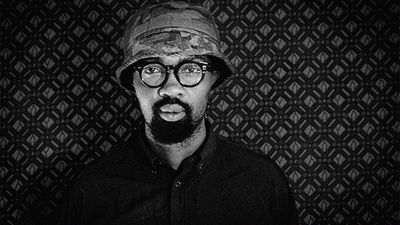#FindMsingi: After Being Falsely Detained as a Terrorist, A Kenyan Photographer Goes Missing
After Kenyan photographer Msingi Sasis was labeled a Terrorist suspect by Kenyan police, his life unravelled. Now he's missing.
Kenyan artist Msingi Sasis, has been missing now for one week and four days. The photographer and writer had been in steady decline since April 2015 when he was arrested outside Nairobi’s Galleria Mall while taking night time photographs for his blog Nairobi Noir.
At the time, police detained him as a ‘terror suspect,’ a label that has followed him ever since. According to a string of Facebook posts from Sasis shortly before his disappearance, the “terrorist” designation led to a loss of income and standing in the community. Earlier this month, Msingi’s financial situation worsened and he found himself homeless and without his belongings.
Msingi’s Facebook posts paint a picture of the photographer devastated by the situation, resorting to auctioning off his most prized possessions including the tools of his trade. Without a camera, a place to live and the imminent end of his blog, fans and fellow artists have been using the hashtag #FindingMsingi to try and track his whereabouts.
Msingi, like many artists in Nairobi routinely face police harassment and find it frustrating to work in an environment with little regard for artists’ working conditions and professional worth. The struggle to find financial institutions willing to loan artists money, to grow their businesses and survive is a tough reality.
Despite Kenya’s growing arts and culture scene, photographers routinely complain about harassment by city council and police officers, who threaten them with arrest and sometimes even beatings. The perception that anyone with a camera or phone aimed at a building or airplane is out to destroy the nation, is not productive or sustainable.
Despite avoiding prosecution, and maintaining a stellar reputation with some of Msingi’s colleagues, the series of events took a toll on the talented photographer who posted the following on Facebook (May 6):
Ever since I was arrested as a 'terrorism suspect' one year ago my life has been shut down and I have become practically jobless. It has become near impossible for me sell any art or get any meaningful work as almost no one, both individuals and organisations, are willing to do a financial transaction or even be involved with a 'terror suspect'.A 'terror suspect' is what my life has been in the past one year. Being a 'terror suspect' means I have not been able earn a living at all. Not being able to earn a living has ment I that I have fallen into and have been accumulating multiple debts. I have suffered this silently and alone, until this point.
I have to tell everyone who found any insight and inspiration in my work goodbye. This week auctioneers siezed everything in my studio. Every valuable thing they placed their hands on. All my cameras, computers, printers, other equipment, and anything that can quickly be sold including hard drives that had every work I have ever created. It's all gone.
I have also defaulted on my rent for many months now and have been issued with an eviction notice which has already expired. What ever was left by the auctioneers in the form of clothing, furniture, and other personal items will be detained by the owner of the property and their agent to recover defaulted rent.
In the next few hours I will be homeless. I am also shutting down Nairobi Noir. Now to find a place where I can sleep on these street I have come to know. Hope for me that somewhere along the way I will get on my feet again. This is the life of an artist as a 'terrorism suspect'.
The talented photographer is known for his street photography, which has appeared on the BBC, Commonwealth Writers and City Lab. The issue of accusing photographers of sinister motives, simply because they capture the city’s landscapes, buildings and surroundings, is not unique to locals. In March 2016, four British tourists were arrested on suspicion of terrorism after snapping pictures of planes at Wilson airport.
Nairobi may be East Africa’s most visible arts and culture center, but there is still a ways to go to make it a capital that is accommodating of its artists and visitors with a love for photography. In the meantime, fans on Twitter have started a #FindingMsingi to try and track him down, while lamenting the artist’s decision to shut down Nairobi Noir.
Tweets:
Adelle Onyango (media personality/radio host)
Any leads on #FindMsingi??? Anyone with info of where he was last spotted etc? Links to family? Anything? pic.twitter.com/npPULMj0m1
— Adelle Onyango (@ADELLEO) May 16, 2016
Ann McCreath (Fashion designer)
Very troubling #FindMsingi Brilliant artist find him! UP Insight: The Case of Msingi Sasis (And Why You Should Care) https://t.co/bekUqhEdcb
— Ann McCreath (@AnnMcCreath) May 13, 2016
Shamit Patel (Homeless in Nairobi founder)
An artist should never have to be subjected to what he's been through just for conducting their art. #FindMsingi
— Shamit Patel (@just_sham_it) May 13, 2016
Boniface Mwangi (Photo-activist)
Family,friends and colleagues of @MsingiSasis are looking for him.He went silent after this post. Msingi get intouch pic.twitter.com/EDnUZ4Eo9W
— Boniface Mwangi (@bonifacemwangi) May 10, 2016
